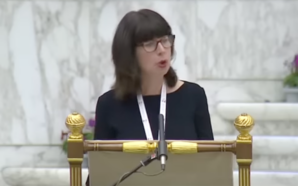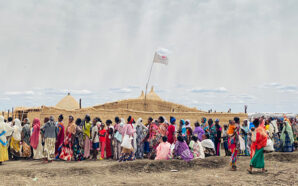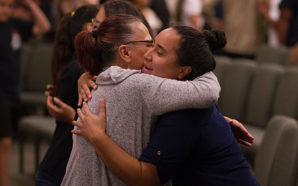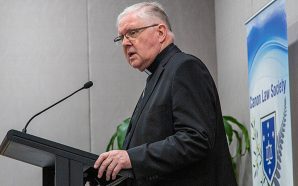When St Benedict proposed in his Rule that “all guests who present themselves are to be welcomed as Christ,” I suspect that he was not referring to a newcomer to an online video conference. Yet, the principles of good hospitality are equally as relevant in the online domain.
The following principles are worth considering when offering an online space:
1. How accessible is our space?
Do we take care not to skip steps in explaining to people how to access the platform, or avoid employing computer jargon which may confuse? First time users may be encouraged to try out our online platform ahead of our official gathering time. Support could be offered in terms of a phone call to assist and talk through accessing a service, again, ahead of the gathering.
2. Consideration of registration
While an online gathering can be advertised, allowing anyone to connect, it is beneficial for attendees to register. This offers a sense of numbers, allows a welcome message and information to be distributed before the gathering (including any meeting protocols), and helps with contacting anyone having trouble connecting.
3. Is there a ministry of caring for the online space?
For larger online gatherings, there is opportunity for an individual or small team to work behind the scenes, helping ensure those who are trying to access the service are cared for. If someone drops out, they can be contacted and helped to reconnect, or followed up after the gathering. Someone in this role can also help monitor online chats and mute/unmute microphones as required. A role such as this frees up the chair or MC from technical concerns.
4. What safety exists within our space?
Simple online protocols include privacy of participant information, requesting that no recording or photos are taken without consent, and offering password protection for a meeting link. Registration also ensures no unwelcome participants will gate crash the gathering. For video meetings, remind participants about not having anything too personal in their background, and to alert other people in audio range of their computer that they are participating in a gathering.
5. What happens before our online space commences?
When people click the link and join our gathering, what is their initial experience? Assuming they come before the gathering starts, are they held in a waiting space (as some services offer) or taken directly into the gathering space. If they arrive in the space, they may have a chance to speak with others present. If this is allowed, ensure a moderator is present to assist introductions. Think of it as being in a foyer before the main event. Another practice is the use of welcoming music, with a welcoming announcement and welcome slide.
6. Acknowledgment of Country
Just as technology has allowed us to be together virtually, an Acknowledgement brings us together as a society and as a country and is an opportunity for all participants in the meeting to pay their respects to Traditional Custodians.
The following is General Acknowledgement from The National Aboriginal and Torres Strait Islander Catholic Council (NATSICC) that could be read aloud or placed on a welcome slide at the beginning of a meeting:
Although we are meeting virtually, we continue to Acknowledge the Traditional Custodians that have, for thousands of years, walked upon and cared for the lands upon which we are all individually located. We acknowledge the continued deep spiritual attachment and relationship of Aboriginal and Torres Strait Islander Peoples to this country and commit ourselves to the ongoing journey of reconciliation.
7. Moving from functional gatherings to encounters
The online space can often become very clinical. The gathering starts, the input is given, discussion takes place, if needed, and the gathering ends. Depending on the group, is there time and opportunity to encounter one another? In small groups, members can introduce themselves. In large gatherings, small breakout rooms can be created for short introductions. This is the heart of hospitality, when we take time to truly experience the other, where Christ is welcomed. There are also light-hearted online icebreaker games that could be incorporated. If you are short on inspiration, google will help.
8. What simple standards might we apply to our gatherings?
Online protocols are important as the environment is sometimes foreign to many people. Will microphones be muted? Will people raise a hand or otherwise indicate if they have a comment? Can a text chat function be enabled and monitored for feedback? If small groups are enabled, how might each group be monitored? Do people have a clear sense of the agenda and the timing of each other? Are messages conveyed in written form as well as verbally?
9. How do we care for participants in structuring our time?
The online medium can be quite tiring. Consider the length of the gathering. If more than an hour, allow time for a comfort break or think about scheduling two sessions. What are participants asked to do during a gathering? If it is mostly listening, can this be broken up by small group discussions or one on one chats. Music can be offered with time for quiet reflection. Images can be shared.
10. What happens at the end of our time together?
Are further resources or offerings shared? Is feedback on the quality of the experience offered? Inviting people to review what is offered helps improve future offerings and honours the contribution of the participant. A simple follow up thank you message is also a great way to affirm those who gather.
Online gatherings are flourishing, and hopefully will continue to be a mainstay long after the pandemic fades from view. Let hospitality flourish in our online interactions.
The Pastoral Planning Office welcomes your own discoveries, initiatives and wisdom. We want to hear from you to share with parishes and communities across our Diocese. We also encourage you to contact your Deanery Pastoral Council chairperson or Dean to share them amongst other communities in your deanery.
The team at the Pastoral Planning Office are available to work with communities via video conferencing and phone to accompany you during these times. Please email pastoralplanning@parracatholic.org for someone from our team to contact you.
Richard McMahon is the Director of Pastoral Planning and Implementation for the Diocese of Parramatta.








